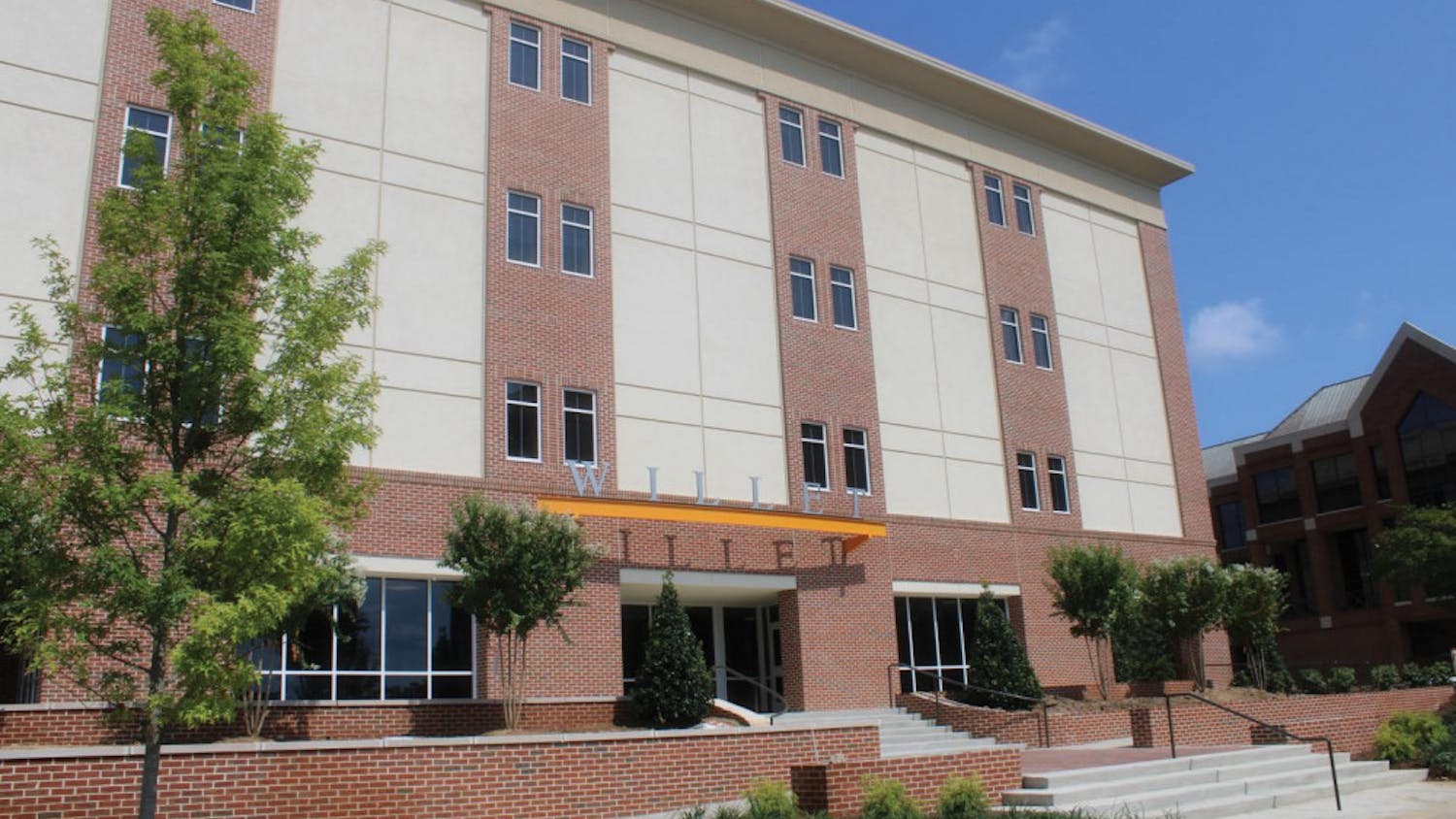Student Government Association Parliamentarian, Gene Mitchell, was asked to resign from his appointed position by SGA president Jordan Locke on April 2. The resignation was a result of Mitchell’s recent opinion article published in The Cluster on March 28.
Mitchell’s article expressed his frustration for the lack of involvement in upcoming SGA elections. Currently, the SGA positions of junior class senator and senator-at-large have only five candidates to fill five availabilities. Therefore, those candidates will be running unopposed.
He explains in his article, “While I applaud those who are running as they, at least, demonstrate the courage to put their name in public view and invite criticism. I must say that some of the candidates who are running lack the competency to give an oral presentation in a one hundred level general education class; it is even more frightening that these same candidates will automatically have the platform to speak whatever is on their mind in front of the Dean of Students and the rest of the student body. These ill-fitted candidates will represent Mercer and will do so because they
will have had no democratic process to vet them.”
In explanation of his article Mitchell explained that, “You need opposition so fruitful debate and passionate ideas can come about. If you look at the campaigns that actually have competition you see a flourish of campaigning all over campus. If you look at the upcoming senior elections with the likes of Sharpe Sablon, and several others, they are campaigning everywhere. If you look at the senator-at large elections and you look at the junior senator election you don’t see any campaigning because they don’t have to.”
Mitchell’s words have stirred up members of SGA and various students resulting in more than 40 comments on The Cluster’s website, many of which have been anonymous. According to Mitchell, “The intent of my article was to say we need more competition because we need more qualified people.”
President Locke explained, “I’m not opposed to students sharing their opinions in The Cluster, in fact I encourage it. The problem I had was not necessarily what he said as a student, if he were just a student than that would have been completely fine, but his main responsibility on SGA is to aid to me, as the president, and my administration in our goals. We have a goal of fostering an environment on SGA that is open to debate and is not destructive personally to anyone who is on the body.”
Locke announced at the SGA meeting on April 2 his reasoning for asking Mitchell for his resignation. In his announcement he stated, “As a fellow member of this body, appointed by myself and confirmed by Senate, it is my opinion that [Mitchell] had a professional obligation to refrain from such an article in The Cluster… My administration does not support explicit name-calling. We do not support what could be perceived as an attack on fellow members of this body. We certainly do not endorse the comments made in the article.”
According to Mitchell, “Those opinions I said about those individuals are not alone. They’re shared in fact, by the same people who asked me to resign.”
Mitchell feels the reasoning behind Locke’s actions consist of contributing factors such as fear and perception. “The end of Jordan’s term is coming up and there was a fear in Jordan’s perception that this could derail what he wanted to accomplish in the last two senates, which was to focus on student achievement. He and I agreed on that.”
Locke was clear that his decision to ask for Mitchell’s resignation had a great deal to do with the amount of legislation that needed to be discussed in the following two senate meetings of the semester.
“We only had two senates left at the time and because of that, I wanted to focus on the legislation rather than any bickering that may have been between senators that may have gotten their feelings hurt,” said Locke.
“The intent of my article was to inspire people to become a part of the government, not to criticize Bentley [Hudgins] or any of them. That was my way of saying, ‘I’m going to give you a specific example,’ because people always say we need
transparency,” said Mitchell.
“[Locke’s] fear was, come time for senate, there would be a crowd of students in the Connell student center and they would be chanting for my impeachment,” said Mitchell. “There were, from my account, seven students present; two were there for legislation to be discussed that night and the other five were there to speak on my behalf. The only backlash was a rush to support my position and my right to speak.”
“I had every inference that if he had not resigned, impeachment charges would be brought against him that evening in senate and without sharing names or motives, I think that with 90 percent certainty, that would have happened which really would have really taken away from the important piece of legislations we were focusing on that night,” said Locke.
Mitchell, however, explained that although he believed there would have been impeachment proceedings, that he would not have been impeached. According to Mitchell, in order to impeach someone from the SGA executive branch, the judicial council must oversee the impeachment process and two thirds of the senate must vote in favor of such impeachment. Mitchell has had no contact with the judicial council.
Mitchell explained that he would have only needed eight votes to prevent an impeachment and he believes he would have had at least 13.
Mitchell believes a factor in Locke's decision was the influence of those closest to Locke. “From what I understand, Secretary [Matt] Townsend was very upset about my article and probably gave a very negative perception to President Locke about what was happening…the second person I understand felt this way was Senator [Trenton] White. So probably from those two individuals, there was talk of them moving to impeach me,” explained Mitchell.
Both Townsend and White declined to comment on the issue of Mitchell's resignation.
Locke explained that he felt the article left students with the idea that SGA is a divisive group and not cohesive in representing student interest. “I do think that it sort of spread some dissension among the senate body and among student perception of SGA,” said Locke.
“I’ve gotten a lot of support for asking for his resignation and those students are just as quick to note how much Gene has accomplished this year and how great a parliamentarian he was,” said Locke. “I don’t want this resignation to squelch
his reputation at all because he was a fantastic member of senate, a fantastic parliamentarian and has done so much for the student body this year. I know that there were a few people who were upset with my decision, but overall senators
understand and agree with my actions.”
“We take an oath to speak frankly and candidly in representing student interest and so I think that it is definitely arguable that the article was completely fine, and in fact, his duty to write,” said Locke. “The second part is to bring honor and merit to our organization and the university and that is the part that most senators felt he did not fulfill.”
“There seems to be this idea that SGA has to present itself with a united front. That’s not what respect is. Respect is understanding each others ideals and being able to listen to the other person and even if you disagree, you have the right to say what you say,” said Mitchell.
Mitchell expressed that he had been given permission by Locke to speak his opinion in both the television show, Young Puns; which discusses Mercer politics, and also his articles for The Cluster about the SGA presidential campaign.
“He made a tough decision and I respect Jordan for that but I think that it was too rash,” said Mitchell. “If he had waited a week he would have realized that although people may disagree with my candor and they may not agree with that I said, most people believe I have a right to say it without the fear of being impeached or fear of being asked to resign.”
Locke explained that the decision to ask Mitchell to resign as parliamentarian was the hardest he has made throughout his presidency.
“I tried to focus on whether or not [Mitchell’s article] broke the oath of office and the repercussions it would have in senate. I think I made the right decision,” said Locke.
“Something that is very important to Gene is the student body and the work of SGA. I think he realized that perhaps, with him [at senate], the focus would very likely not be on the issues at hand. It would be on an article which was debatably,
inappropriate for an executive member to write,” said Locke.
“I have a great deal of personal respect for Mr. Mitchell and I personally think that he saw that [the article] wasn’t received the way he intended it to be and that partially played into the reason why he accepted my request for his resignation.”
The final SGA meeting of the year will take place on Monday, April 9 with elections for next year’s office taking place April 9-13.
SGA president calls for parliamentarian's resignation





